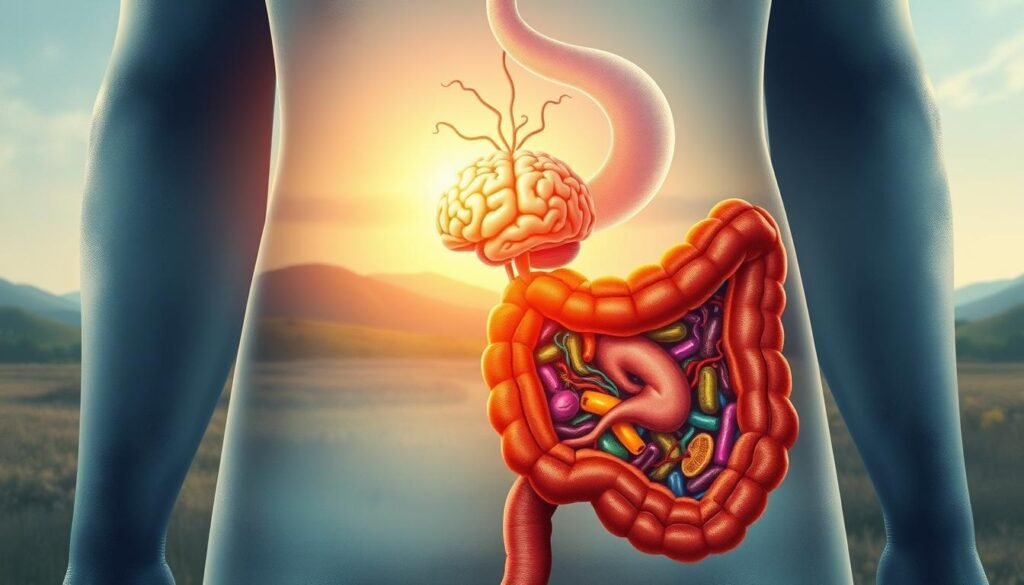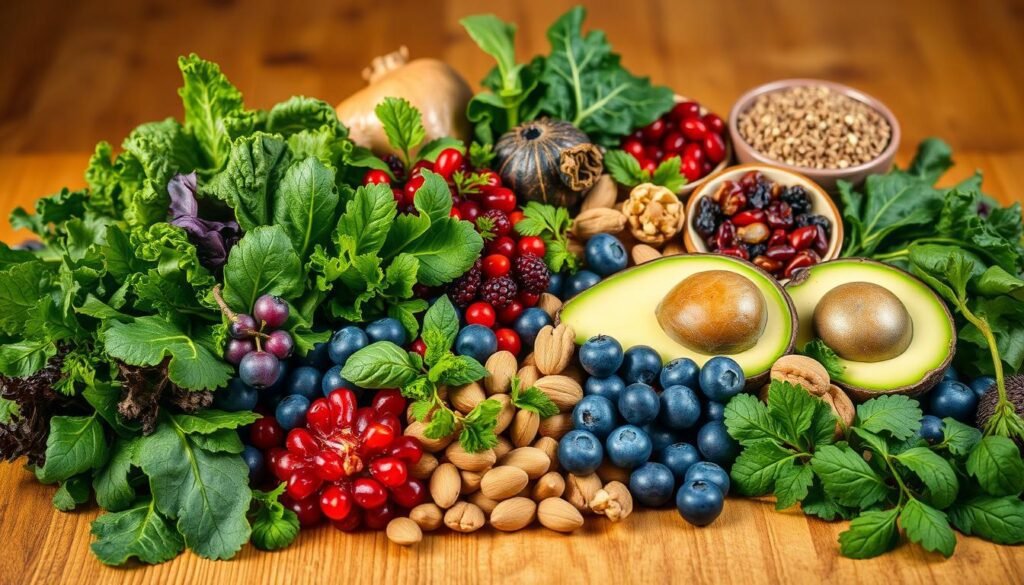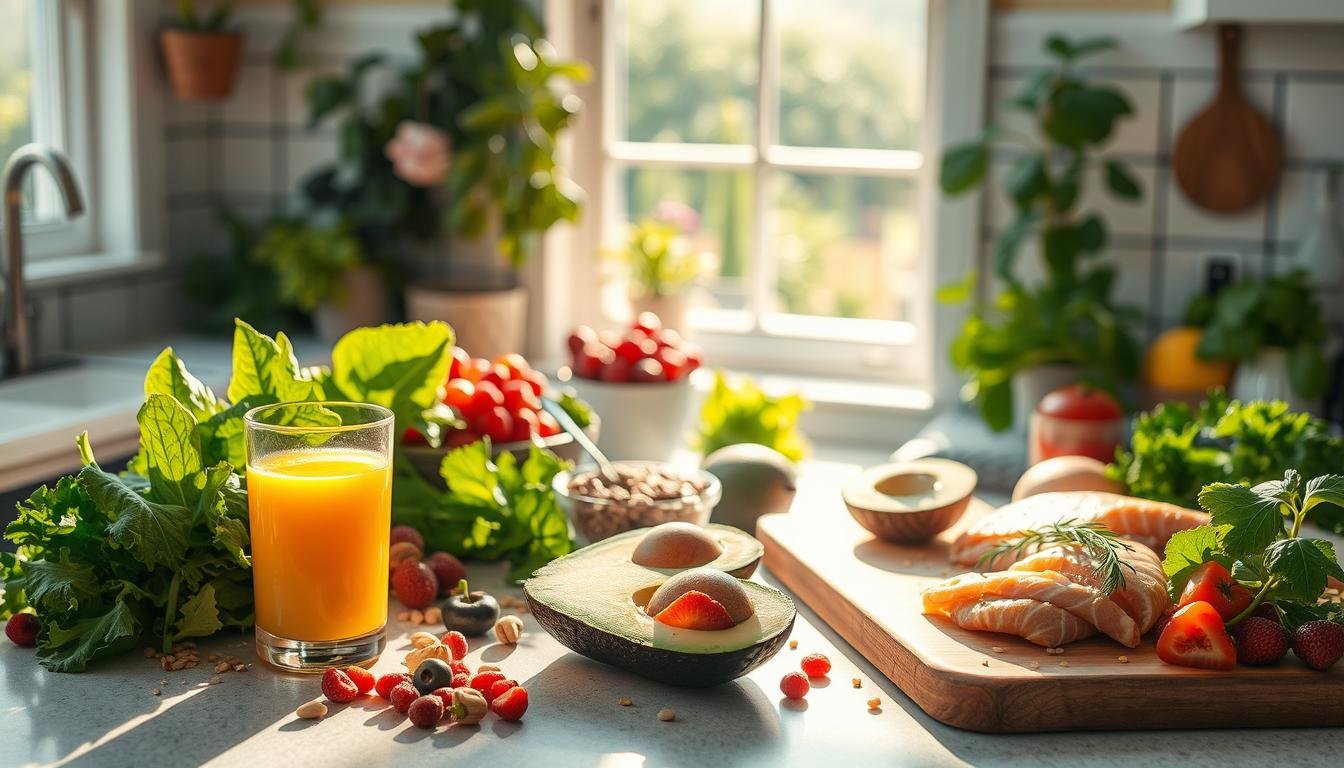Nourish Your Mind: Nutrition Tips for Better Mental Health
Food has long been recognized as a powerful tool for physical health, but its impact on mental wellness is equally profound. Dr. Uma Naidoo, a leading expert in nutritional psychiatry at Massachusetts General Hospital, emphasizes that what we eat directly influences our brain and mood. The gut-brain connection, a key focus of her work, highlights how the digestive system and mental health are deeply intertwined1.
Recent studies show that certain foods, like those rich in omega-3 fatty acids and antioxidants, can combat inflammation and protect the brain from oxidative stress1. Additionally, probiotics play a vital role in supporting mental well-being by promoting a healthy gut microbiome1. Essential nutrients such as folate, B-vitamins, and vitamin D are also crucial for neurotransmitter synthesis and mood regulation1.
With the pandemic leading to a decline in mental health, there’s been a surge in interest in how diet can help. This guide combines clinical expertise with practical steps to help you make informed choices for your brain and overall well-being.
Key Takeaways
- Food directly impacts brain function and mood.
- The gut-brain connection is essential for mental wellness.
- Omega-3s and antioxidants protect the brain from stress.
- Probiotics support a healthy gut microbiome.
- Essential nutrients like vitamin D are vital for mood regulation.
The Silent Pandemic: How Nutrition Impacts Mental Health
The pandemic era has revealed how closely our eating habits and mental state are connected. As stress levels soared, many turned to comfort foods, creating a cycle that worsened emotional well-being. Dr. Uma Naidoo, a leading expert, observed a significant rise in patients seeking help for depression, anxiety, and insomnia during this time2.
Processed foods, often consumed during stressful periods, disrupt gut bacteria balance. This imbalance leads to inflammation, which can exacerbate mental health conditions2. Studies show that diets high in processed foods are linked to a 32% higher risk of depression3.
On the other hand, nutrient-dense diets can make a difference. Gundersen Health found that high-fiber foods, like vegetables, reduce anxiety and stress due to their anti-inflammatory effects2. Fermented foods, such as kimchi and miso, restore gut bacteria, supporting emotional well-being2.
Nutritional psychiatry is emerging as a promising treatment. It focuses on how food choices influence brain function and mood. For example, omega-3 fatty acids, found in fish and seeds, reduce anxiety by lowering brain inflammation2.
Inflammation plays a key role in mental health conditions. Poor diet can cause gut inflammation, which contributes to symptoms like low mood and fatigue2. Addressing this through better eating habits can be a powerful step toward emotional balance.
The Gut-Brain Connection: Why Your Diet Affects Your Mood
Your gut is often called your ‘second brain,’ and for good reason. The gut and brain are in constant communication through the vagus nerve, a key highway that sends signals between these two systems4. This connection explains why what you eat can directly influence how you feel.

Up to 95% of serotonin, a neurotransmitter linked to mood, is produced in the gut4. When your digestive system is out of balance, it can lead to emotional symptoms like anxiety or low mood. This highlights the importance of maintaining a healthy gut for overall well-being.
How Inflammation Triggers Mental Health Conditions
Inflammation plays a significant role in mental health. When the gut is inflamed, harmful substances like lipopolysaccharides (LPS) can cross the blood-brain barrier, triggering symptoms of depression and anxiety4. Studies show that specific markers like CRP and IL-6 are often elevated in individuals with mood disorders4.
Processed foods, especially ultra-processed options, are major culprits in causing gut inflammation4. These foods disrupt the balance of gut bacteria, leading to a cycle of poor digestion and emotional distress. On the other hand, high-fiber diets have been shown to reduce anxiety risk by 27%5.
Good vs. Bad Gut Bacteria: What You Eat Matters
The balance of bacteria in your gut is crucial for mental health. Research shows that individuals with depression often have different microbiome profiles compared to those without4. To support good bacteria, focus on prebiotic and probiotic foods.
- Probiotic foods like yogurt, kimchi, and miso introduce beneficial bacteria to your gut4.
- Prebiotic foods such as bananas, garlic, and oats feed the good bacteria already present4.
Dr. Uma Naidoo, a leading expert in nutritional psychiatry, emphasizes the importance of a gut-healing protocol. This includes reducing processed foods and incorporating anti-inflammatory options like omega-3s and fermented foods4.
“Healing the gut is often the first step toward emotional balance.”
By making mindful choices about your diet, you can support both your gut and your brain, paving the way for a healthier, happier you.
Nutrition Tips for Mental Health: Foods That Boost Your Mood
The foods we eat play a significant role in shaping our emotional well-being. From fiber-rich vegetables to omega-3-packed fish, certain choices can help reduce stress and improve mood. Let’s explore three key categories of mood-boosting foods.
Plants: Fiber-Rich Veggies to Reduce Stress
Vegetables are packed with fiber, which supports gut health and reduces inflammation. Studies show that eating five or more servings daily can lower depression risk by 33%6. Some unexpected high-fiber options include jicama, artichokes, and okra.
These veggies not only provide essential nutrients but also help stabilize blood sugar levels. This balance is crucial for maintaining emotional stability throughout the day7.
Fermented Foods: Probiotics for a Healthy Gut
Fermented foods like kimchi, yogurt, and miso introduce beneficial bacteria to your gut. These probiotics support digestion and mood regulation by maintaining a healthy microbiome8.
However, some individuals may need to consider histamine levels in fermented foods. For a quick gut-friendly option, try this simple kimchi recipe using Napa cabbage.
Omega-3 Fatty Acids: The Brain’s Essential Fats
Omega-3s are vital for brain health and mood regulation. Fatty fish like sardines contain 1,480mg of EPA/DHA per 3oz serving6. Plant-based sources like flaxseeds and walnuts also provide these essential fatty acids, though their bioavailability is lower than animal sources.
Walnuts are unique because they contain melatonin, which can support better sleep8. For those curious about their omega-3 levels, the Omega-3 Index test offers valuable insights.
| Food Type | Key Benefit | Example |
|---|---|---|
| Fiber-Rich Vegetables | Reduces inflammation and depression risk | Jicama, Artichokes, Okra |
| Fermented Foods | Supports gut health and mood regulation | Kimchi, Yogurt, Miso |
| Omega-3 Fatty Acids | Essential for brain health and mood stability | Sardines, Flaxseeds, Walnuts |
By incorporating these foods into your diet, you can take a proactive step toward emotional balance. Small changes in your plate can lead to big improvements in how you feel.
Powerhouse Nutrients for Mental Well-Being
Certain nutrients act as silent heroes, quietly supporting your emotional balance and brain function. From the sunshine vitamin to antioxidant-rich spices, these elements play a vital role in how you feel every day.

Vitamin D: The Sunshine Vitamin’s Role in Mood
Vitamin D is essential for brain health and serotonin production, a neurotransmitter that regulates mood. Surprisingly, 42% of US adults are deficient in this nutrient, which can lead to emotional imbalances9.
There are two forms of supplementation: D2 and D3. Research shows that D3 is more effective at raising blood levels of vitamin D9. Aim for optimal levels between 50-80 ng/mL to support your emotional well-being.
Spices: Hidden Superfoods with Antioxidant Benefits
Spices like turmeric, saffron, and cinnamon are packed with antioxidants that combat inflammation and support brain health. Turmeric’s curcumin, for example, increases BDNF production by 62%, promoting better mood10.
Saffron has been shown to have SSRI-like effects in clinical trials, making it a natural option for emotional balance9. Cinnamon, on the other hand, helps regulate blood sugar, which can stabilize mood swings.
“Spices are nature’s way of healing, offering both flavor and function.”
Here’s a simple recipe to incorporate these spices into your routine:
- Golden Milk Latte: Mix 1 cup of warm milk, 1 tsp turmeric, a pinch of black pepper, and a dash of cinnamon. Black pepper enhances curcumin absorption, maximizing its benefits10.
By focusing on these powerhouse nutrients, you can take meaningful steps toward a healthier, happier you.
Teas That Calm and Focus Your Mind
Tea has been a trusted companion for centuries, offering both comfort and clarity in every sip. Whether you’re looking to ease stress or sharpen your focus, certain teas can make a world of difference. From green tea’s brain-boosting properties to chamomile’s calming effects, these brews are more than just beverages—they’re natural remedies for your mind.
Green Tea for Anxiety and Brain Fog
Green tea is a powerhouse for mental clarity. It contains L-theanine, an amino acid that increases alpha brain waves by 40%, promoting relaxation without drowsiness11. This unique compound also improves cognitive performance, particularly attention and reaction times, making it ideal for those dealing with brain fog11.
Matcha, a type of green tea, has a higher theanine-to-caffeine ratio, offering sustained energy without jitters. For optimal benefits, steep green tea at 175°F for 2-3 minutes. This ensures you get the most out of its mood-enhancing properties12.
Chamomile and Herbal Blends for Relaxation
Chamomile tea is a go-to for relaxation. Its active compound, apigenin, binds to GABA receptors, providing calming effects similar to benzodiazepines11. This makes it an excellent choice for reducing anxiety and improving sleep quality12.
Herbal blends like chamomile and lemon balm are perfect for nighttime. Lemon balm enhances relaxation, while passionflower inhibits GABA transaminase, further promoting calmness12. For a soothing bedtime ritual, try this simple blend:
- 1 tsp chamomile flowers
- 1 tsp lemon balm leaves
- Steep in hot water for 5 minutes
Hibiscus tea is another great option, known for its calming properties and potential heart health benefits. However, if you’re considering valerian root, use it cautiously due to its strong sedative effects12.
Easy Pantry Staples for Stressful Days
On stressful days, having the right pantry staples can make all the difference. Whether you’re craving something sweet or salty, or need a quick, budget-friendly meal, these options will keep you fueled and focused.
Healthy Snacks for Sweet and Salty Cravings
When cravings strike, reach for snacks that satisfy without compromising your well-being. Walnuts, for example, contain 2.5g of omega-3s per ounce, supporting both heart and brain health13. Pair them with dried fruit for a balanced trail mix that keeps energy levels steady.
For a salty fix, opt for low-sodium canned fish like wild-caught salmon. It’s a budget-friendly source of omega-3s and protein14. Keep dark chocolate (85% cocoa or higher) on hand for a sweet treat that also supports gut health13.

Budget-Friendly Frozen and Canned Options
Frozen and canned foods are lifesavers when you need quick, nutritious meals. Frozen spinach retains 90% of its original nutrients, making it a nutrient-dense addition to soups or smoothies15. Microwave blanching can restore its texture and flavor in minutes.
Canned beans, especially BPA-free options, are versatile and shelf-stable. They’re perfect for adding protein to salads, stews, or dips. For probiotic benefits, stock miso and tempeh, which support gut health and can help reduce stress13.
- Compare unit prices: Bulk nuts are often more affordable than packaged options.
- DIY trail mix: Combine 1 part nuts, 1 part seeds, and 1 part dried fruit for energy balance.
- Emergency stash: Keep dark chocolate and nuts on hand for quick, mood-boosting snacks.
How to Eat for Consistent Energy and Mood
Maintaining steady energy and a positive mood starts with how you fuel your body. Skipping meals can lead to a drop in blood sugar, causing nervousness and irritability16. This imbalance often triggers an adrenaline response, leaving you feeling fatigued and foggy17.
Why Skipping Meals Worsens Anxiety
When you go too long without eating, your body releases cortisol, a stress hormone. Studies show that waiting more than three hours between meals increases cortisol levels by 28%16. This can heighten feelings of anxiety and make it harder to focus.
Hypoglycemia, or low blood sugar, is another common issue. Symptoms like weakness, tiredness, and “fuzzy mindedness” can disrupt your day18. Regular meals help stabilize glucose levels, keeping your brain and body functioning optimally17.
Balancing Carbs, Fats, and Proteins
A balanced diet is key to sustaining energy and mood. Carbohydrates should make up about 50% of your daily intake, providing essential fuel for your brain and muscles17. Choose whole grains and vegetables for a slower release of energy, helping to manage blood sugar spikes16.
Healthy fats, like those found in avocados and olive oil, support brain health. Unhealthy fats, on the other hand, can negatively impact mood and energy16. Protein is equally important, with 50g per day needed for neurotransmitter synthesis, which aids mood regulation17.
“Eating regularly helps maintain steady energy levels and prevents overeating later.”
| Macronutrient | Daily Intake | Examples |
|---|---|---|
| Carbohydrates | 50% | Whole grains, vegetables |
| Fats | 65g | Avocados, nuts, olive oil |
| Protein | 50g | Beans, fish, eggs |
For busy schedules, batch-cooking can help maintain consistent eating patterns. Prepare meals in advance to ensure you always have a balanced option on hand17. Snacks like nuts and whole fruits are great for maintaining steady energy and preventing blood sugar drops16.
The Truth About Fats and Carbs for Mental Health
Understanding the role of fats and carbs in brain function can transform how you approach your diet. These macronutrients are not just energy sources—they are essential for maintaining cognitive health and emotional balance19.
Why Your Brain Needs Healthy Fats
Did you know that 60% of your brain mass consists of lipids? This makes fats a critical component for brain health19. Unsaturated fats and omega-3 fatty acids, found in avocados, nuts, seeds, and fatty fish, support brain development and mental well-being20.
Phospholipids, a type of fat, play a key role in building neuronal membranes. They ensure proper communication between brain cells, which is vital for focus and memory19. MCT oil, a type of healthy fat, is quickly absorbed and converted into energy, making it a great option for brain function18.
Smart Carb Choices for Stable Blood Sugar
Carbohydrates are the brain’s primary energy source, providing 20% of the body’s glucose needs18. However, not all carbs are created equal. Choosing whole grains, fruits, and vegetables helps maintain stable blood sugar levels, which is crucial for mood and energy18.
Resistant starch, found in foods like green bananas and cooked-and-cooled potatoes, feeds beneficial gut bacteria. This supports both digestion and mental health19. Timing your carb intake, especially in the evening, can also boost serotonin production, promoting better sleep and mood18.
| Healthy Fat Sources | Benefits |
|---|---|
| Avocados | Rich in monounsaturated fats and lutein for cognitive function20 |
| Fatty Fish | High in omega-3s for brain health18 |
| Olive Oil | Supports heart and brain health19 |
By incorporating these fats and carbs into your diet, you can support your brain and maintain emotional balance. Small changes in your food choices can lead to significant improvements in how you feel every day.
Meal Planning Tips for Mental Wellness
Planning your meals with intention can transform how you feel every day. By focusing on foods that support your brain and gut, you can create a routine that promotes emotional balance and sustained energy21. Meal preppers save an average of 3 hours weekly, making it easier to stick to healthy choices22.
Building a Grocery List Around Brain Foods
Start by incorporating a variety of nutrient-dense foods into your grocery list. Include omega-3 rich options like salmon, chia seeds, and walnuts for better mood regulation22. Don’t forget fermented foods like yogurt and sauerkraut, which support gut health and emotional well-being22.
Try the “rainbow shopping” technique by selecting colorful fruits and vegetables. This ensures a wide range of antioxidants and vitamins, which are essential for brain function21. Shelf-life hacks, like storing herbs in water or freezing ripe bananas, can also help reduce waste and keep your kitchen stocked with fresh ingredients.
Simple Recipes to Support Gut Health
Here’s a quick 15-minute gut-healing soup recipe: Sauté garlic and ginger in olive oil, add chopped vegetables like carrots and zucchini, then simmer with vegetable broth and a cup of cooked lentils. Lentils provide 18g of protein and 16g of fiber per cup, making them a powerhouse for gut health22.
Batch cooking is another great strategy. Prepare large portions of meals like roasted vegetables or quinoa bowls, and store them for later. This not only saves time but also ensures you always have a nutritious option on hand21.
Incorporating fermented foods like kimchi or kefir into your meals can also support your gut microbiome. These foods introduce beneficial bacteria, which play a key role in mood regulation22. For a budget-friendly option, try making your own sauerkraut at home.
“Meal planning reduces stress and ensures you’re nourishing your body and mind.”
By focusing on these strategies, you can create a meal plan that supports both your physical and emotional well-being. Small changes in your routine can lead to big improvements in how you feel every day.
When to Seek Help Beyond Nutrition
While dietary changes can support emotional well-being, some situations require professional intervention. Recognizing the signs that you need additional help is crucial for managing mental health effectively23.
If you experience persistent feelings of sadness, hopelessness, or anxiety, it may be time to consult a specialist. Other red flags include difficulty sleeping, changes in appetite, or thoughts of self-harm23. These symptoms often indicate underlying mental health conditions that need targeted treatment.
There are various types of mental health professionals to consider. Psychiatrists can prescribe medications, while psychologists focus on therapy and behavioral interventions. Licensed clinical social workers (LCSWs) provide counseling and support for daily challenges23.
Dietitians also play a key role in managing emotional well-being. Accredited Practising Dietitians (APDs) offer personalized, evidence-based advice to help you make dietary changes linked with positive outcomes24. Many insurance plans now cover these services, making them more accessible.
Combining nutritional strategies with conventional treatments often yields the best results. For example, integrating omega-3 fatty acids with SSRIs can enhance their effectiveness23. However, always consult your healthcare provider before making changes to your treatment plan.
Massachusetts General Hospital’s integrative psychiatry model is a great example of this approach. It combines lifestyle interventions, such as diet and exercise, with traditional therapies to address the root causes of disorders23.
If you or someone you know is in crisis, don’t hesitate to reach out for help. The National Suicide Prevention Lifeline (1-800-273-TALK) offers 24/7 support. Remember, nutrition is a powerful tool, but it works best as part of a comprehensive care plan23.
| Professional | Role |
|---|---|
| Psychiatrist | Prescribes medications |
| Psychologist | Provides therapy |
| LCSW | Offers counseling and support |
| Dietitian | Provides nutritional guidance |
“Integrating lifestyle changes with professional care can transform mental health outcomes.”
Conclusion
Taking small, mindful steps in your daily habits can lead to significant improvements in how you feel. Start by incorporating more fruits, vegetables, and omega-3 rich foods into your meals. These choices support brain function and emotional balance25.
Avoiding processed foods and sugary snacks can reduce cravings and improve focus. Instead, focus on complex carbs, lean proteins, and healthy fats for sustained energy25. Keeping a food journal can help you identify and change unhealthy patterns.
If you’re struggling, don’t hesitate to seek professional guidance. Trusted resources like the American Dietetic Association offer evidence-based advice25. Combining dietary changes with expert support can yield the best results.
Empower yourself by making gradual, sustainable changes. Download a meal plan emphasizing nutrient-dense foods to guide your journey25. Consider taking a mental health screening to assess your emotional well-being and tailor your approach.
Remember, small steps can lead to big improvements. Start today and take control of your well-being.
FAQ
How does diet influence my mood and mental well-being?
What you eat directly affects your brain function and mood. Nutrient-rich foods like fruits, vegetables, and healthy fats support brain health, while processed foods and sugar can lead to inflammation and worsen symptoms of anxiety or depression.
What are the best foods to support gut health and mental health?
Fermented foods like yogurt, kimchi, and sauerkraut are rich in probiotics, which promote good gut bacteria. Fiber-rich veggies, beans, and whole grains also help maintain a healthy gut, which is linked to better mood regulation.
Why are omega-3 fatty acids important for the brain?
Omega-3s, found in fatty fish, walnuts, and flaxseeds, are essential for brain function. They help reduce inflammation and support cognitive health, which can improve focus and reduce symptoms of depression.
Can vitamin D really affect my mood?
Yes! Vitamin D, often called the sunshine vitamin, plays a key role in regulating mood. Low levels are linked to depression, so include sources like fortified dairy, eggs, or consider supplements if needed.
What are some easy snacks for stressful days?
Keep nuts, seeds, or dark chocolate on hand for quick, healthy options. These provide energy and nutrients without the crash that comes from sugary snacks.
How can I balance my meals for stable energy and mood?
Combine carbs, proteins, and healthy fats in every meal. For example, pair whole-grain toast with avocado and eggs. This balance helps maintain steady blood sugar levels and keeps your energy consistent.
Are carbs bad for mental health?
Not all carbs! Choose complex carbs like whole grains, fruits, and veggies. They provide steady energy and support brain function, unlike refined carbs that can cause blood sugar spikes and crashes.
What teas can help calm my mind?
Green tea is great for focus and reducing anxiety, while chamomile and herbal blends like peppermint or lavender can help you relax and unwind.
When should I seek help beyond diet for mental health?
If symptoms of anxiety, depression, or other conditions persist despite dietary changes, consult a healthcare professional. Nutrition is a powerful tool, but it’s not a substitute for medical treatment when needed.
Source Links
- https://www.highfocuscenters.com/nourish-your-mind-the-impact-of-nutrition-on-mental-health/ – How Nutrition Impacts Your Mental Health | High Focus Centers
- https://www.massgeneral.org/news/coronavirus/tips-to-improve-mental-health-with-nutrition – Tips to Improve Mental Health with Nutrition
- https://medcitynews.com/2022/06/the-power-of-food-security-on-mental-health-can-this-be-one-of-the-missing-puzzle-pieces-to-solve-our-silent-pandemic/ – The power of food security on mental health: Can this be one of the missing puzzle pieces to solve our silent pandemic? – MedCity News
- https://www.uclahealth.org/news/article/you-are-what-you-eat-diet-may-affect-your-mood-and-brain – You are what you eat: Diet may affect your mood and brain function
- https://www.hopkinsmedicine.org/health/wellness-and-prevention/the-brain-gut-connection – The Brain-Gut Connection
- https://nutrition.org/how-to-boost-mental-health-through-better-nutrition/ – How to Boost Mental Health Through Better Nutrition – American Society for Nutrition
- https://www.mentalhealth.org.uk/explore-mental-health/a-z-topics/diet-and-mental-health – Diet and mental health
- https://www.piedmont.org/living-real-change/good-mood-foods-what-to-eat-for-mental-health – What to eat for mental health
- https://chefsforseniors.com/blog/nourishing-the-mind-the-link-between-mental-health-and-nutrition/ – Nourishing the Mind: The Link Between Mental Health and Nutrition
- https://www.awakenedpathcounseling.com/top-10-foods-to-support-your-mental-health/ – Top 10 Foods to Support Your Mental Health – Awakened Path Counseling
- https://www.theteaspot.com/blogs/steep-it-loose/the-power-of-tea-for-mental-health-a-soothing-remedy – The Power of Tea for Mental Health: A Soothing Remedy
- https://www.healthline.com/health/mental-health/tea-for-stress – These 13 Herbal Teas Can Help You Reduce Your Stress and Improve Your Brain Health
- https://www.everydayhealth.com/diet-nutrition-pictures/how-to-reduce-stress-with-diet.aspx – 10 Best Foods to Fight Stress
- https://www.healthline.com/nutrition/stress-relieving-foods – 18 of the Best Stress-Relieving Foods
- https://health.clevelandclinic.org/eat-these-foods-to-reduce-stress-and-anxiety – 30+ Foods To Help With Anxiety
- https://mhanational.org/resources/eating-well-being/ – Eating for well-being | Mental Health America
- https://www.gundersenhealth.org/health-wellness/eat-move/the-link-between-nutrition-and-your-mental-health – The link between nutrition and your mental health
- https://www.bda.uk.com/resource/food-facts-food-and-mood.html – Food and mood
- https://www.beatalewismd.com/blog-2/how-dietary-fat-impacts-your-mental-health – How Dietary Fat Impacts Your Mental Health — Beata Lewis MD
- https://www.helpguide.org/wellness/nutrition/choosing-healthy-fats – Choosing Healthy Fats – HelpGuide.org
- https://lifesum.com/nutrition-explained/the-power-of-routine-how-to-build-consistency-in-eating-for-mental-wellness – The Power Of Routine: How To Build Consistency In Eating For Mental Wellness
- https://mindfulhealthsolutions.com/eat-your-way-to-happiness-the-link-between-healthy-eating-and-mental-health/ – Eat Your Way to Happiness: The Link Between Healthy Eating and Mental Health
- https://www.psychiatry.org/patients-families/lifestyle-to-support-mental-health – Lifestyle to Support Mental Health
- https://dietitiansaustralia.org.au/health-advice/mental-health-including-anxiety-and-depression – Mental health including anxiety and depression
- https://www.sutterhealth.org/health/eating-well-for-mental-health – Eating Well for Mental Health | Sutter Health
Share this content:




Post Comment